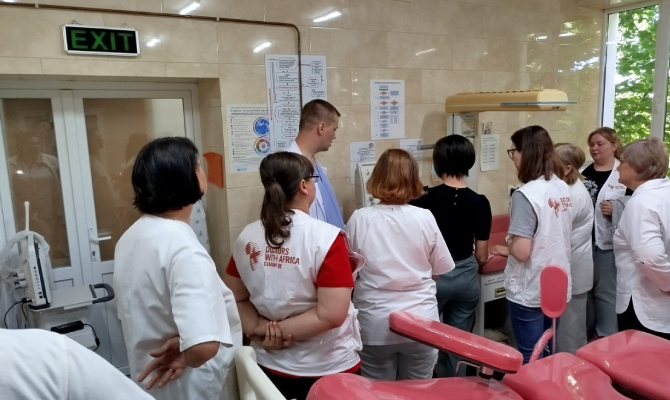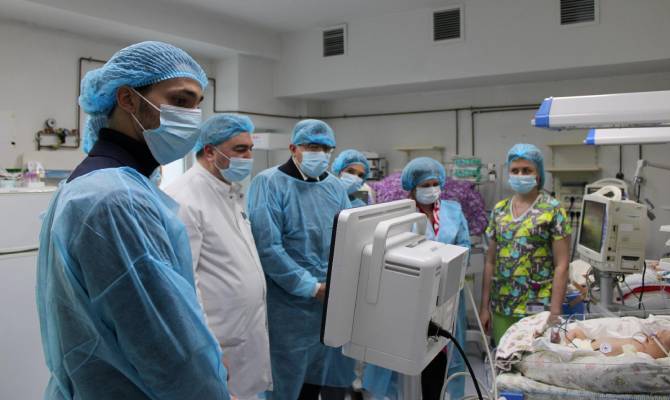92 health workers coming from 7 facilities across the country have been trained on neonatal emergencies and stabilization as part of the R.I.S.E. project implemented by Doctors with Africa CUAMM UK. Such project is part of a 46,5 million euro initiative funded by the Italian Agency for Development Cooperation, reaching 900,000+ people affected by the Ukraine crisis.
The trainings were designed in collaboration with the Moldovan Paediatric Association with the ultimate goal of fostering capabilities on emergency neonatal resuscitation and stabilization among local medical staff serving both at primary hospitals and secondary health facilities therefore strenghtening the national health system.
The first phase of the activity started with a 5-days training of trainers held by Dr. Daniele Trevisanuto – Neonatologist and CUAMM doctor and dedicated to 7 professionals from both IMAC Hospital and the Ministry of Health (MoH). By empowering a group of skilled instructors, the activity had a trickle-down effect on a wider network of health workers from 7 facilities disseminated troughout the Country namely Soroca, Orhei, Ungheni, Edinets, Hincesti, Cahul and Causeni thus ensuring a sustainable impact.
«The courses organised have a significant impact on the practice of health workers in district hospitals. Considering the low opportunities they have to practice resuscitation, such activity can indeed support professionals and improve their clinical skills through both theoretical and practical information» claimed Dr. Olga Rotari – Neonatologist from IMAC and ToT.
In Moldova, there are 32 hospitals handling a total of 27,000 births annually. However, many of these facilities have a low number of deliveries per year, below 500, resulting in limited exposure to maternal and newborn emergencies from health workers. Additionally, hospital data reports a high rate of post-birth transfers from peripheral facilities, that are not equipped with intensive care units, to third-level facilities located in the capital. Having qualified staff at peripheral level is therefore of paramount importance to guarantee quality and timely newborns care after delivery.
For this reason, the second phase of the training activity aimed at empowering health professionals serving in second level hospitals with a 2- day training course at each of the 7 hospitals. The methodology embraced both frontal learning, through explanation and powerpoint presentations, and practical experiences. Simple and complex neonatal resuscitation scenarios were staged, where all the participants were requested to apply the techniques explained in a highly stressful situation. The overall 92 participants involved were represented by different professionals including 9 neonatologists, 13 gynaecologists, 8 paediatricians, 34 midwives, 25 nurses and 3 anesthetists who had the opportunity to navigate and practice on multiple concepts and procedures including neonatal resuscitation, neonatal asphyxia, diagnosis and treatment of hypoglycemia and pneumothorax emergency.
«The course was a great opportunity because not only we consolidated some previous knowledge, but also learnt new information. Although we try to assimilate as much as we can during courses, we do not come across situation that requires these skills in our daily practice. Such lack of exercise leads us to loosing confidence and capacities which we regain with these trainings» said Ciobirca Ana – midwife at Hincesti Regional Hospital.
The success of the training is reflected in the significant improvement in the participants’ knowledge, as measured by the test delivered at the very beginning and end of the training. In the pre-test, the participants from the 7 facilities reached an average 60% score, while the post-test showed an accuracy of 93%, with an increase of 33 points percentage.

Maternal mortality rate has significantly decreased in Moldova over the past 10 years, dropping from 44 per 100,000 live births in 2010 to 19 in 2017, the infant mortality rate per 1,000 live births has declined from 26 in 2010 to 12 in 2019 thanks to the proactive commitment of the Ministry of health and health workers. However, this rate still remains above the WHO index for European regions. Although maternal and infant mortality rates have reduced over the years, there is a margin to improve the mortality index and the output of emergency procedures by working on the remaining gaps regarding referral and post-natal healthcare in peripheral hospitals.
Since the conflict broke out on 24th February, 2022, approximately over one million refugees crossed the border seeking refuge in Moldova, one of Europe’s most fragile countries. To prevent the collapse of the national healthcare system and address the healthcare needs of both the refugee and local populations, targeted interventions have been deemed necessary. CUAMM’s commitment in the country started in April 2022 in the capital Chişinau. Since then and in close collaboration with the Ministry of Health and the WHO, the intervention has been guided by the twofold objective of providing basic medical assistance within RACs and offering specific training for local medical personnel on neonatal emergency. The commitment also extends to Ukraine, focusing on the delivery of medicines, medical equipment, and consumables to healthcare facilities; distribution of food items, essential goods, and equipment to combat the cold; as well as providing psychological support to the most vulnerable. Our project, is part of a 46,5 million euro initiative funded by the Italian Agency for Development Cooperation, reaching 900,000+ people affected by the Ukraine crisis.





